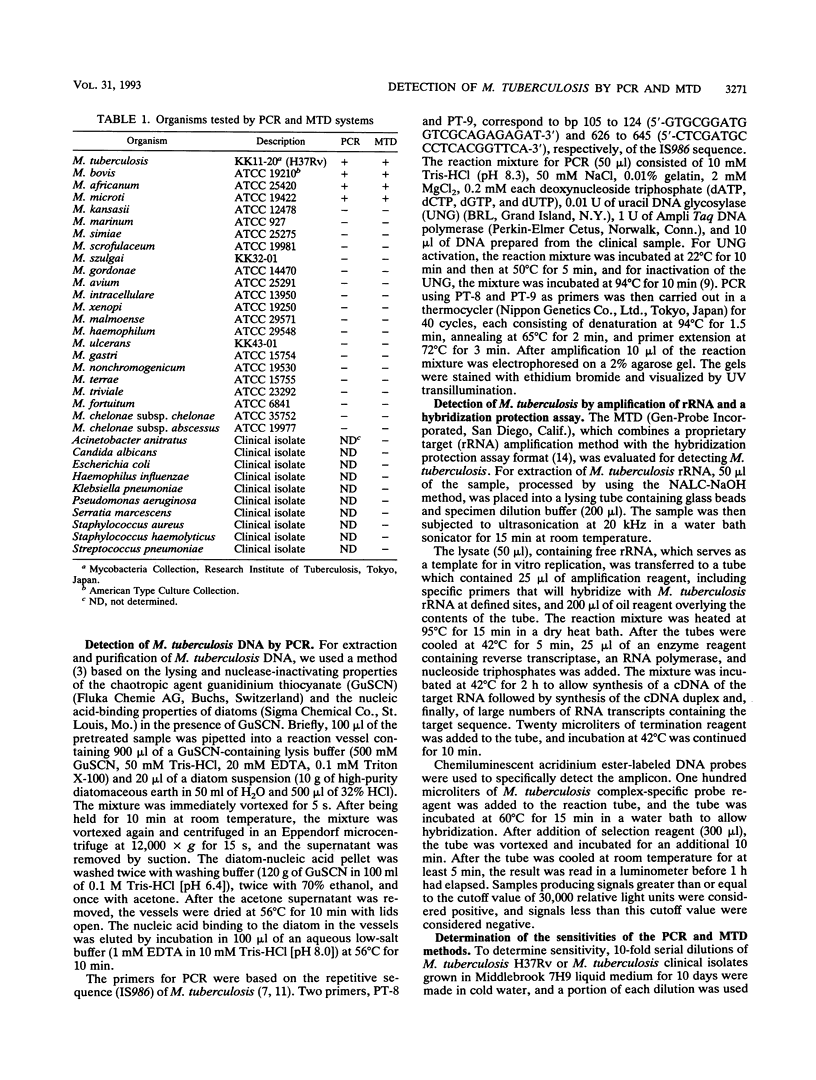Abstract
The polymerase chain reaction (PCR) using oligonucleotides based on the repetitive sequence (IS986) of Mycobacterium tuberculosis as a primer and the Gen-Probe Amplified Mycobacterium Tuberculosis Direct Test (MTD), which combines an M. tuberculosis rRNA amplification method with the hybridization protection assay format, were evaluated for detection of M. tuberculosis in clinical samples. The detection limits of these two assay systems based on nucleic acid amplification for cultured M. tuberculosis were less than 10 cells per reaction. A total of 135 sputum specimens were examined by the two assay systems. The PCR and the MTD systems for detection of M. tuberculosis gave overall positivity rates of 84.2% (32 of 38) and 91.9% (34 of 37), respectively, as compared with 71.9% (23 of 32) by smear and 96.9% (31 of 32) by culture in the liquid medium MB-Check. Procedures for sample preparation used in the two methods were different. Although the sensitivities of the PCR and MTD appeared to be similar to that of culture with the MB-Check system, the two methods based on nucleic acid amplification should be very useful for rapid detection of M. tuberculosis infections without the long time required for culture of M. tuberculosis.
Full text
PDF




Images in this article
Selected References
These references are in PubMed. This may not be the complete list of references from this article.
- Abe C., Hosojima S., Fukasawa Y., Kazumi Y., Takahashi M., Hirano K., Mori T. Comparison of MB-Check, BACTEC, and egg-based media for recovery of mycobacteria. J Clin Microbiol. 1992 Apr;30(4):878–881. doi: 10.1128/jcm.30.4.878-881.1992. [DOI] [PMC free article] [PubMed] [Google Scholar]
- Altamirano M., Kelly M. T., Wong A., Bessuille E. T., Black W. A., Smith J. A. Characterization of a DNA probe for detection of Mycobacterium tuberculosis complex in clinical samples by polymerase chain reaction. J Clin Microbiol. 1992 Aug;30(8):2173–2176. doi: 10.1128/jcm.30.8.2173-2176.1992. [DOI] [PMC free article] [PubMed] [Google Scholar]
- Boom R., Sol C. J., Salimans M. M., Jansen C. L., Wertheim-van Dillen P. M., van der Noordaa J. Rapid and simple method for purification of nucleic acids. J Clin Microbiol. 1990 Mar;28(3):495–503. doi: 10.1128/jcm.28.3.495-503.1990. [DOI] [PMC free article] [PubMed] [Google Scholar]
- Brisson-Noël A., Gicquel B., Lecossier D., Lévy-Frébault V., Nassif X., Hance A. J. Rapid diagnosis of tuberculosis by amplification of mycobacterial DNA in clinical samples. Lancet. 1989 Nov 4;2(8671):1069–1071. doi: 10.1016/s0140-6736(89)91082-9. [DOI] [PubMed] [Google Scholar]
- De Wit D., Steyn L., Shoemaker S., Sogin M. Direct detection of Mycobacterium tuberculosis in clinical specimens by DNA amplification. J Clin Microbiol. 1990 Nov;28(11):2437–2441. doi: 10.1128/jcm.28.11.2437-2441.1990. [DOI] [PMC free article] [PubMed] [Google Scholar]
- Drake T. A., Hindler J. A., Berlin O. G., Bruckner D. A. Rapid identification of Mycobacterium avium complex in culture using DNA probes. J Clin Microbiol. 1987 Aug;25(8):1442–1445. doi: 10.1128/jcm.25.8.1442-1445.1987. [DOI] [PMC free article] [PubMed] [Google Scholar]
- Isenberg H. D., D'Amato R. F., Heifets L., Murray P. R., Scardamaglia M., Jacobs M. C., Alperstein P., Niles A. Collaborative feasibility study of a biphasic system (Roche Septi-Chek AFB) for rapid detection and isolation of mycobacteria. J Clin Microbiol. 1991 Aug;29(8):1719–1722. doi: 10.1128/jcm.29.8.1719-1722.1991. [DOI] [PMC free article] [PubMed] [Google Scholar]
- KUBICA G. P., DYE W. E., COHN M. L., MIDDLEBROOK G. Sputum digestion and decontamination with N-acetyl-L-cysteine-sodium hydroxide for culture of mycobacteria. Am Rev Respir Dis. 1963 May;87:775–779. doi: 10.1164/arrd.1963.87.5.775. [DOI] [PubMed] [Google Scholar]
- Kolk A. H., Schuitema A. R., Kuijper S., van Leeuwen J., Hermans P. W., van Embden J. D., Hartskeerl R. A. Detection of Mycobacterium tuberculosis in clinical samples by using polymerase chain reaction and a nonradioactive detection system. J Clin Microbiol. 1992 Oct;30(10):2567–2575. doi: 10.1128/jcm.30.10.2567-2575.1992. [DOI] [PMC free article] [PubMed] [Google Scholar]
- Longo M. C., Berninger M. S., Hartley J. L. Use of uracil DNA glycosylase to control carry-over contamination in polymerase chain reactions. Gene. 1990 Sep 1;93(1):125–128. doi: 10.1016/0378-1119(90)90145-h. [DOI] [PubMed] [Google Scholar]
- Manjunath N., Shankar P., Rajan L., Bhargava A., Saluja S., Shriniwas Evaluation of a polymerase chain reaction for the diagnosis of tuberculosis. Tubercle. 1991 Mar;72(1):21–27. doi: 10.1016/0041-3879(91)90020-s. [DOI] [PubMed] [Google Scholar]
- McAdam R. A., Hermans P. W., van Soolingen D., Zainuddin Z. F., Catty D., van Embden J. D., Dale J. W. Characterization of a Mycobacterium tuberculosis insertion sequence belonging to the IS3 family. Mol Microbiol. 1990 Sep;4(9):1607–1613. doi: 10.1111/j.1365-2958.1990.tb02073.x. [DOI] [PubMed] [Google Scholar]
- Middlebrook G., Reggiardo Z., Tigertt W. D. Automatable radiometric detection of growth of Mycobacterium tuberculosis in selective media. Am Rev Respir Dis. 1977 Jun;115(6):1066–1069. doi: 10.1164/arrd.1977.115.6.1066. [DOI] [PubMed] [Google Scholar]
- Nelson N. C., Kacian D. L. Chemiluminescent DNA probes: a comparison of the acridinium ester and dioxetane detection systems and their use in clinical diagnostic assays. Clin Chim Acta. 1990 Dec 17;194(1):73–90. doi: 10.1016/0009-8981(90)90304-b. [DOI] [PubMed] [Google Scholar]
- Pao C. C., Lin S. S., Wu S. Y., Juang W. M., Chang C. H., Lin J. Y. The detection of mycobacterial DNA sequences in uncultured clinical specimens with cloned Mycobacterium tuberculosis DNA as probes. Tubercle. 1988 Mar;69(1):27–36. doi: 10.1016/0041-3879(88)90037-2. [DOI] [PubMed] [Google Scholar]
- Roberts M. C., McMillan C., Coyle M. B. Whole chromosomal DNA probes for rapid identification of Mycobacterium tuberculosis and Mycobacterium avium complex. J Clin Microbiol. 1987 Jul;25(7):1239–1243. doi: 10.1128/jcm.25.7.1239-1243.1987. [DOI] [PMC free article] [PubMed] [Google Scholar]
- Snider D. E., Jr, Roper W. L. The new tuberculosis. N Engl J Med. 1992 Mar 5;326(10):703–705. doi: 10.1056/NEJM199203053261011. [DOI] [PubMed] [Google Scholar]
- Takahashi M., Kazumi Y., Fukasawa Y., Hirano K., Mori T., Dale J. W., Abe C. Restriction fragment length polymorphism analysis of epidemiologically related Mycobacterium tuberculosis isolates. Microbiol Immunol. 1993;37(4):289–294. doi: 10.1111/j.1348-0421.1993.tb03212.x. [DOI] [PubMed] [Google Scholar]




